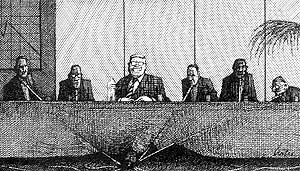 The signature campaign in New York City against the 4 October palace intervention shows the size to which our political centre has shrunk. When we were told that Nepalis in the Big Apple wanted the House of Representatives restored, we almost began applauding how Girija Prasad Koirala had kept his organisational skills intact.
The signature campaign in New York City against the 4 October palace intervention shows the size to which our political centre has shrunk. When we were told that Nepalis in the Big Apple wanted the House of Representatives restored, we almost began applauding how Girija Prasad Koirala had kept his organisational skills intact. Then, it turned out that many in the audience at Hari Bansa Acharya's new movie Je Bho Thikai Bho at Eagle's Theater, Jackson Heights thought their signatures were meant for accounting purposes. (Much like what many Kangresi MPs must have felt during those parliamentary party numbers game).

Before you could wonder why an individual chose to start a pro-democracy campaign when there were so many Nepali organisations in New York, the man himself stepped in. He's furious that the newspaper twisted his story right from the headline.
The Internet petition drive launched on November (www.petitiononline.com/demonepal/petition.html) is heavily skewed against the king's personal preferences to pass the fairness test. A text that refers to Article 127 of the constitution six times pretends Article 27 (3) doesn't exist. Don't count on informed debate, unless you believe lowering of the stature of the palace enhances the status of the parties.
The petitioner raised an interesting question, though. "Perhaps the world's disinterest with the affairs of Nepal is because it is not a lucrative destination for the big corporations or because it does not have weapons of mass destruction and no oil fields. But are the Nepalese not humans?" For a country that was being hailed as a model democracy until the Maoists began arming themselves, the international silence over the palace move is deafening. Not too many governments have come out in full support of the Lokendra Bahadur Chand government. The portentous part is that not too many have opposed it, either.
Has the rest of the world, too, lost hope in Nepali leaders? Corrupt and inefficient governments have survived as long as they held multiparty elections and tolerated a free press. Our post-1990 leadership was careful on this score. (Okay, okay, they messed with the elections, but it's not as if they were about to postpone it indefinitely). Was there something innately local that riled foreign governments and donors? With revenue receipts no longer sufficient to fund regular expenditures, there must be something more than traditional depravity at the customs and excise departments to account for our conspicuous consumption: pilferage of aid money. For long, donors complained that scarce government resources that should be funding health, nutrition and education programmes were being squandered. With foreign aid influenced by political and strategic considerations, we countered, how principled could our absorptive capacities be?
The battle turned openly nasty when the Nepal Development Forum warned us against falling deeper into the mire of bad governance. When key participants at the London meeting on political instability and poverty read out the names of Nepal's top baddies, there was no turning back. The new anti-corruption laws acquired a political momentum of their own.
Commission for Investigation of Abuse of Authority chief Surya Nath Upadhyaya recently explained to The Washington Times how politicians and bureaucrats steal foreign aid money. "The procurement of goods, estimates for building infrastructure, the contract awards are areas where one can always get some 'skim' out of it. So everybody involved in development projects would like to have some share from the public money." Unfortunately, he adds, Transparency International has been doing corruption studies in many countries (India, Pakistan and Bangladesh) but unfortunately, in Nepal, such a study has not been done. (Why isn't he so candid back home?)
This is a double whammy for donors. First, legislators on the appropriations committees and pressure groups back home keep asking why all those billions have made the average Nepali poorer. Second, the Maoists and other malcontents think donors are propping up a decaying state. When the political class tries to shield itself by criticising the callousness of those driving Nepal's development, can you blame donors for shooting their mouth off?
It's unclear whether, like the peaceniks say, a crackdown on corrupt politicians and bureaucrats would be more effective than cracks of gunfire in countering the Maoists insurgency. There's a lesson, though, for the next generation of Nepali democrats: Don't bite the hand that feeds you. If you have to, be sure you don't bark at it.


